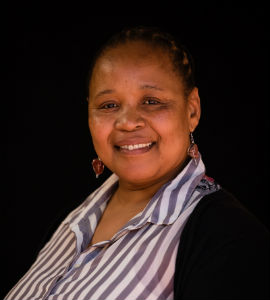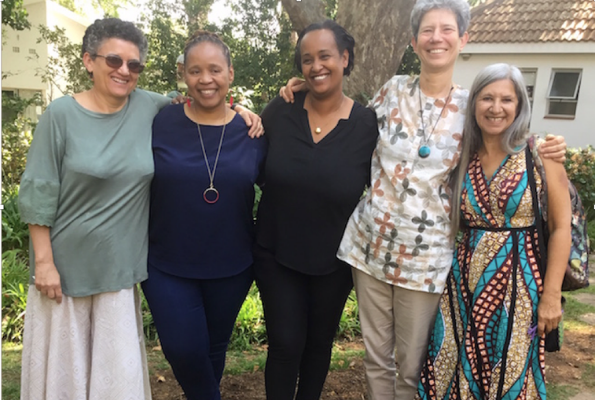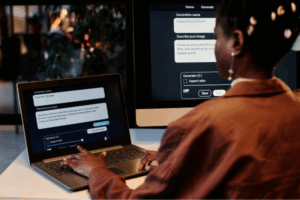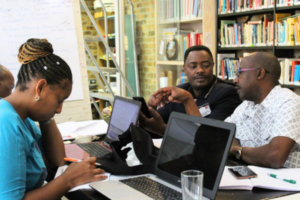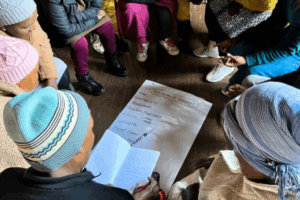SRGBV initiative facilitators: L-R Nina Benjamin, Nosipho Twala, Mahelet Hailemariam, Michel Friedman and Shamin Meer
It is a Monday morning in April. The trees are blowing in the gentle wind, the sun is beaming bright. I am ushered into the headquarters of the Zambian National Union of Teachers (ZNUT). Leah Kasaji, ZNUT’s Director for Gender, holds my hand as we walk past the groups of teachers who’ve come to the headquarters for different reasons. Leah introduces me to her colleagues. We move from office to office greeting and shaking hands with everyone. A group of teachers arrive and request to speak to the organiser. I am taken to the boardroom while Leah and Simon talk to the teachers.
The boardroom is still, which is a stark contrast to the buzzing sounds in the reception area. The caterer is setting up the table. She greets me with a warm smile and offers me a cup of coffee. I gladly accept, the alluring smell of coffee forbids me to say no. Members of the change team start arriving for the mentoring meeting. Herbert, from Southern province, arrives first. There is laughter and jubilation as others arrive and all happy to see each other.
I put the Tai Chi music on and we start doing the exercises. Everyone is in sync, and you can tell they have been practising. When we are about to finish Tai Chi two people peep through the door and looking at Leah, Joe and Samuel, they comment, “These are the exercises Leah made us do during the other workshop”. We sit around the table about to start our check-in and the door opens once again. This time teachers are looking for Samuel. I sigh and think that this meeting will not begin as planned. Was it a mistake to hold the meeting in the union’s office? Can the change team be present despite the disturbances? Joe picks up on my anxiety and explains that early mornings at ZNUT are always buzzing, but today it is more so because of the many different trainings that are taking place. After ten minutes of waiting, Samuel joins us. He draws on his humour to apologise for the interruptions. He tells us that the teachers he went to assist are members of the School-Related Gender-Based Violence (SRGBV) reference group in Lusaka. They have come to report a case of SRGBV in their school. During the check-in, everyone shares from their heart how they are feeling.
I then ask them to share how they and ZNUT are keeping the SRGBV initiative alive. They look at each other and respond almost simultaneously, “We didn’t do much because of the cholera outbreak”. I learn that schools and public gatherings were suspended for a few months as a prevention measure following an outbreak of cholera. It is only when I start asking questions about the cholera outbreak and how the union responded to the crisis that they start to reflect on their role as the change team and reference group. They begin mapping and reflecting on their different interventions for the cholera crisis. They tell me that they had not seen it necessary to share this with me because the actions had not been part of their change plans. They only intervened because they had to respond to the crisis. After an hour of reflecting, they are surprised to realise that the crisis served as a catalyst because it cultivated urgency and allowed them to openly and willingly work as a team and to do things differently to create a clean and safe learning environment free of cholera and SRGBV. Through the reflections, the change team was also surprised to realise that they had made contributions to dealing with SRGBV. The change team began to see the importance of reflection in making their work visible.
I realise that many of us struggle with reflection, and especially self-reflection because it requires soul searching. As activists, we often overlook the fact that reflection helps us to understand where we are in our practice. We struggle with being conscious of what we do and how we do it and that makes reflection difficult.
I used to think that reflection was gendered, with women being more uncomfortable to reflect on their strengths and successes because they are socialised to be seen and not heard and that this blocks women from “blowing their own trumpets”, or praising themselves. But through this process, I realise that reflection is a general human struggle.
Reflection after an action allows us to learn from our experience and has huge benefits in increasing self-awareness. We learn from reflection about our uncertainties and mistakes. Reflection is important because it helps us uncover “what we know, but do not know that we know” and “what we do not know and want to know”.
Walking out of the office on the second day, I encounter smiles of satisfaction. The buzz of conversation and laughter filled the silent room that I first walked into. I could tell by the vibrant energy in the room and smiles on people’s faces that the meeting was a great success. As a facilitator, I was touched to see the team reflecting on their practice and impact. One of the change team members said, “We want SRGBV programmes to remain in our books for a long time. It must form part of ZNUT even when we are no longer there. It must be part of our DNA.”
It was evident that the team was working together and trying their best to do more with less. Part of the reason they are hands-on is to be able to monitor and check if members are reporting incidents of SRGBV. The team developed hypotheses that they are going to test. Indeed, the initiative allowed the change team’s passion to ignite a flame in the teachers. The mentorship meeting surfaced questions that had never been asked and inspired Joe to write a poem about nature and crocodiles.
I loved the fact that as change agents, they were now aware that change starts with them, that they should become the change they would love to see in others because it is hypocritical to expect others to become the change you are not. This initiative has touched their hearts and all of them are passionate about seeing change and becoming the change. The big question for change teams was how to use their passion to sustain the initiative to fight SRGBV in Zambia.
Holding the meeting in the ZNUT headquarters helped me to understand the change team’s context, including the realities and challenges. Most of the change team members are directors. I had assumed that directors deal with administration and delegation. I was surprised to see change team members running around and consulting with their teams to assist members who came to the office for help. I got an opportunity to feel and experience the culture in the office.
When I mirrored my assumptions on their roles as directors back to them, Samuel said that the SRGBV initiative had changed their understanding of leadership:
“We had to adapt and change because this is not a project but an initiative. It will not disappear next year. It will help us to get our respect and dignity back as teachers. Because of the initiative, we can now gladly roll our sleeves and work hard to support, mentor and build the confidence of members.”
The Education Unions Take Action to end School-Related Gender-Based Violence (SRGBV) initiative is part of a decades-long quest by global teachers’ union Education International (EI) and UN Girls’ Education Initiative (UNGEI) to advocate for the advancement of gender equality in the education sector and in trade unions organising in the sector. The Labour Research Service supported the SRGBV initiative in Africa. Know more about this work.

